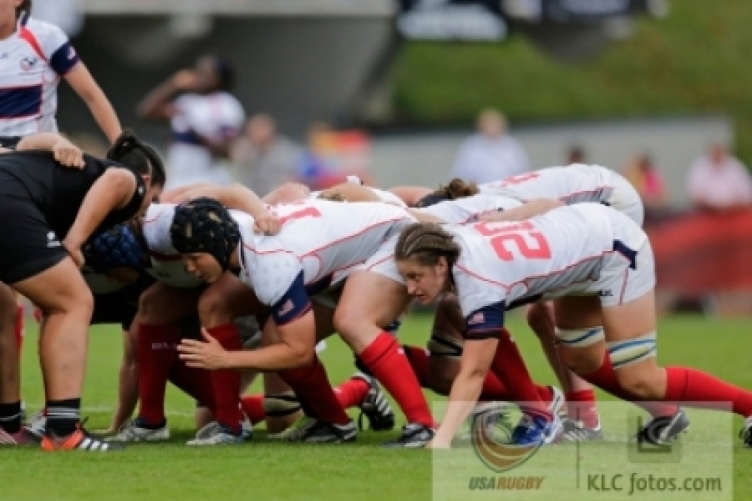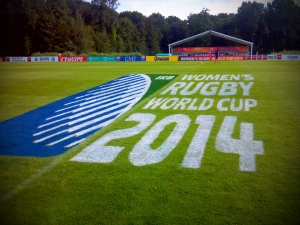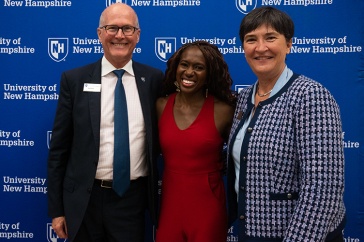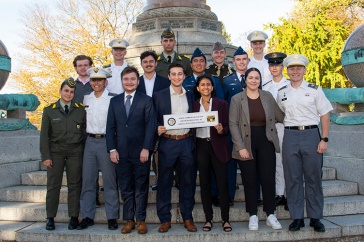
Jamie Burke (center, black cap) during an August 2014 rugby match in Paris with the USA women’s rugby team.
Jamie Burke has spent the last several years at UNH working toward her Ph.D. in education. She’s hit a few bumps along the way, like when her research didn’t cooperate, and when she had a setback in her data collection. But Burke is nothing if not determined.
Sounds like one of those trite things people always say about someone faced with an arduous task, right? Well, consider this: Three times now Burke’s studies have been interrupted for months while she trained to compete with the U.S. women’s rugby team. Months.
And: rugby. If you’ve ever seen a match, you know the kind of grit and strength and resilience the game requires. It’s a tough sport. Burke is a prop, one of the players at the front of the pack that locks heads while trying to get the ball.
In August, Burke was in Paris with the team, playing in her third World Cup tournament. Her first was in Edmonton, Alberta, in 2006, just when she was due to start at UNH. Next came London, 2010, where she was one of the team captains.
Burke first started playing rugby in 1998 at the University of Virginia in Charlottesville, Va., earning All-American honors 2000 through 2003. In 2003, she won the prestigious Woodley Award, given to the top collegiate player in the country. She joined the USA national team in 2004.
In 2010, Burke won the Thomas V. Moser, M.D. Memorial Scholarship given to outstanding rugby players pursuing educational goals that maximize their potential.
She hit a career highlight in August, earning her 50th cap, the first female rugby player in the U.S. to attain the status that marks the player’s number of international competitions. Last summer Burke, 33, surpassed the previous record holder to become the most capped woman in the history of U.S. rugby.
“Playing rugby has given me a community and family all over the world. For the past decade it has been the major driver for the decisions I’ve made--where I live, the type of work I do, etc.,” Burke says. “This is a blessing in some ways, but also has its downsides in that it has taken priority over most other things as well, which means things get put on the back burner. Things like my dissertation -- it's almost impossible to be a full-time athlete and full-time student without something getting short-changed.”
In December, she will reach another life milestone when, after seven years, she will finally receive her doctorate. Her focus then will be off of nearly half a lifetime spent playing rugby and on to getting on with her career. 
“At this point in my life, I have played rugby for as long as I haven't--17 years. So I could never just cut it out, but my body has taken a beating and I am ready to hang up the cleats, so to speak,” Burke says. “I would ultimately love to get back to this level as a coach, but I fully intend to give myself a much needed break as well as the time to really focus and get the last of my dissertation done.”
After that, the Virginia native says, comes putting the Ph.D to work. Her goal is to find a job in social justice teacher education, what Burke describes as “teaching teachers how to teach in a socially just and responsible way that acknowledges the backgrounds and history of their students and uses teaching as a platform for working to address social ills.”
Playing rugby at the level she has been able to compete has been a dream come true, Burke says. She has learned balance, and how to better care for herself. She has gained perspective.
“The lessons of resilience and perseverance I have learned through rugby will help guide my future,” Burke says. “That’s something I’ll take with me wherever I am.”
-
Written By:
Jody Record ’95 | Communications and Public Affairs | jody.record@unh.edu



















































